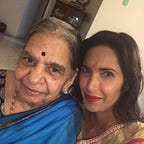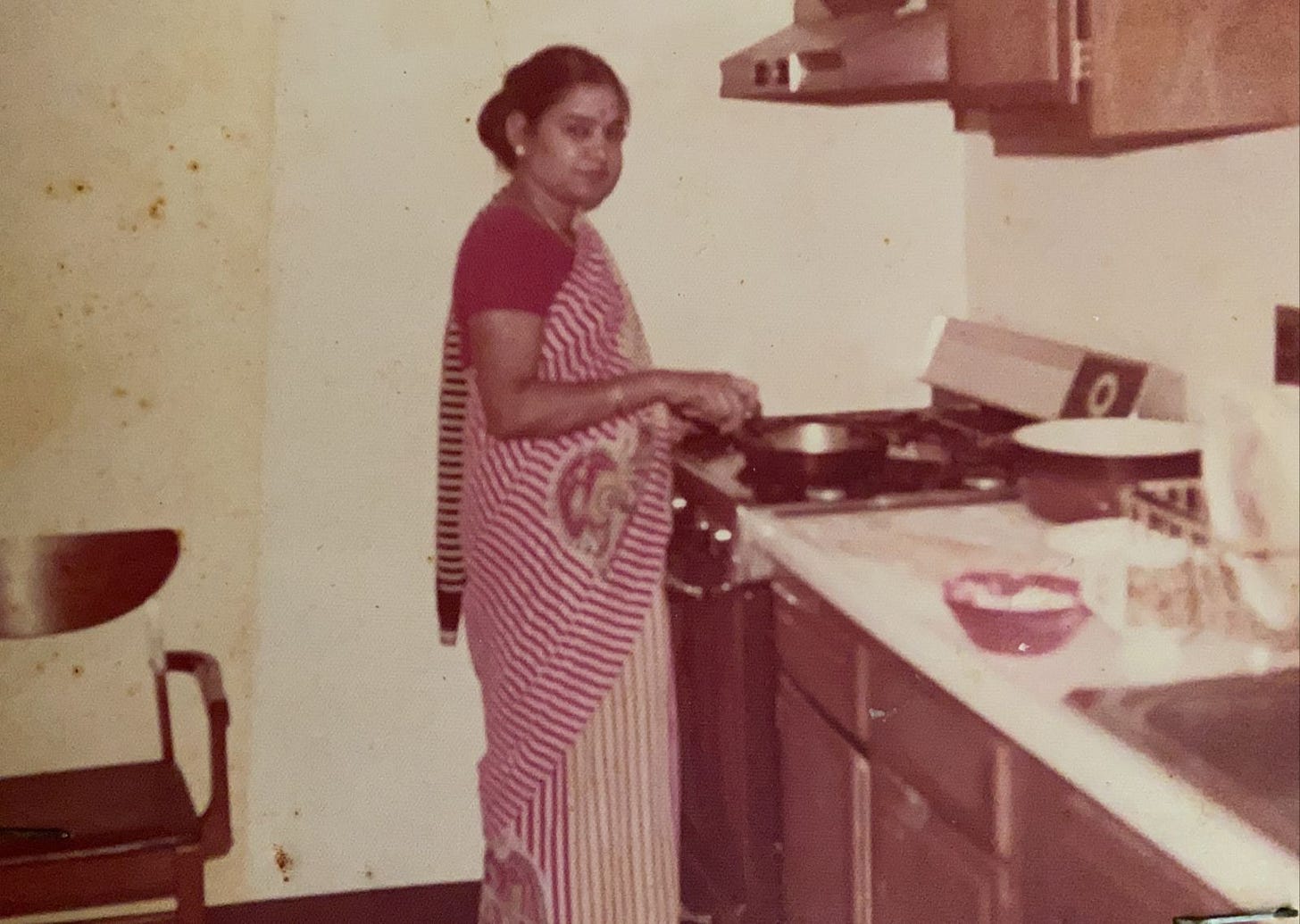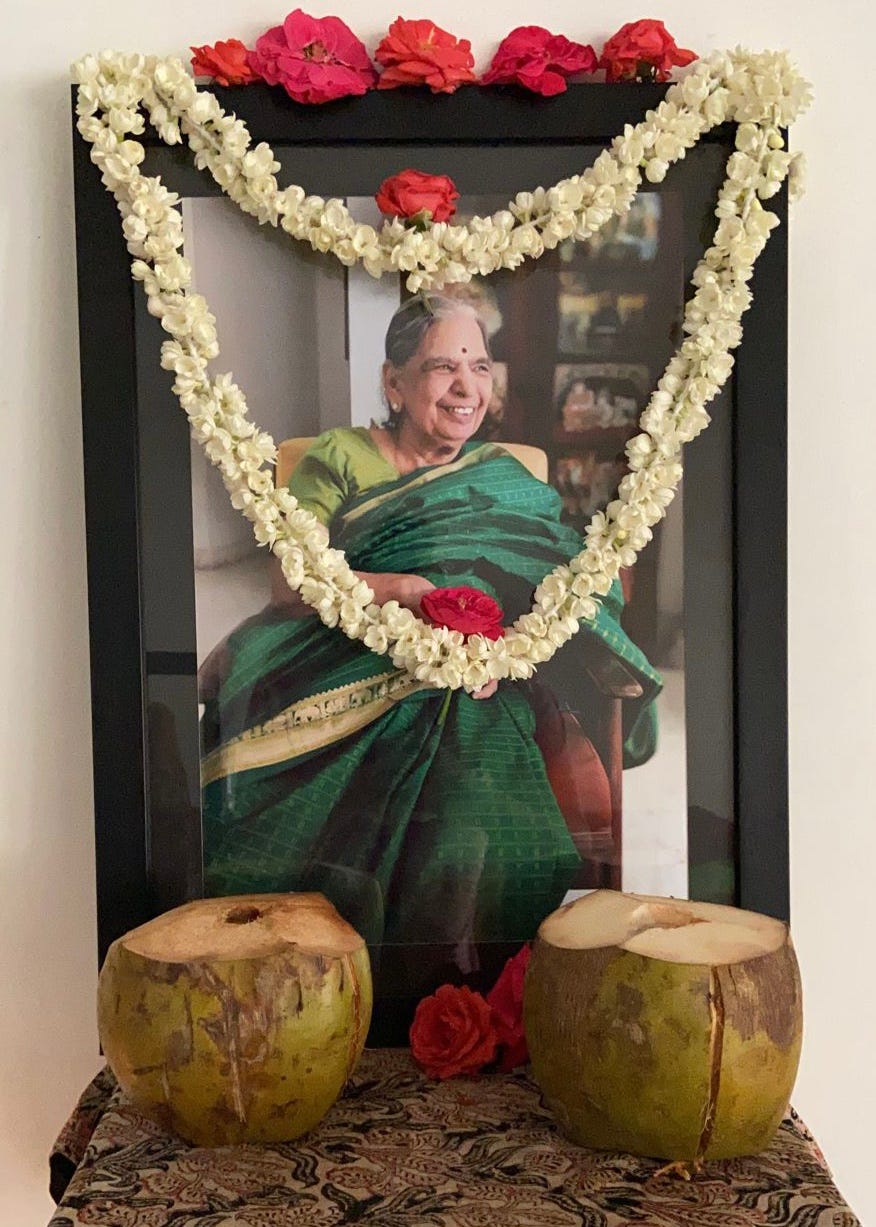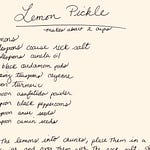Hi Substackers,
I’ve had a heartbreaking and exhausting week… I recorded this in Chennai after my dear paati, Rajima, passed away.
This was not at all easy for me to post… I wavered and grappled with whether to share or keep this voice message private. Was this too much, this grief? Would it seem as if I was milking this time of mourning after what I had already put on social? Was it just too raw and excruciating? Well, grief can be excruciating. It has been for me.
I’ve felt flayed, then half an hour later I’ve felt like I’d be fine, like the worst was over because my grandma lived a long life, was at peace now and I was there after all. Right? Then two hours later, I’d be in pieces weeping and crumpled on the floor again. It was hard to know when the next wave would come, plus I had a sick child at home. But I felt it was important for my child to see me experience all of this so she could learn that life is filled with so much, that my grief was commensurate to my love. I needed to teach her how to nurse me as well. Ok, but did I need to share it on Substack? Did people need to hear the pain in my voice? Is everything for public consumption?
I struggled with these questions for quite some time, but ultimately, I’ve decided to share it. I’ve always wanted Substack to be a place to be vulnerable. To try things that scared me. I also wanted to acknowledge this grief and to honor Jima.
I chose to post my voice because grief is something we talk so little about. We rarely see it in our polished and ‘manufactured for consumption and advancement’ world. So many of us have experienced such loss. To look our pain in the eye is also to accept we are human. To say- its’s ok not to be ok all the time. I’m sorry if the sound of my voice makes you cringe, I understand why it might.
Now enough about me, let’s celebrate her.
Rajima was much more than a grandmother, the only one I’ve known. She was a natural-born teacher and lived her life serving others. She was patient and humble, with a bright demeanor and infectious smile.
Although love and passion beget marriage in my world, the same was not so for my grandparents. From the start, Jima did not expect love, though she came to be deeply loved and respected by my Tha-tha (grandfather) and everyone in our family. Jima did not expect happiness, though she could pluck from deep within the appreciation of simply being fed, clothed, sheltered, and regarded.
By thirty years old, Jima had, unlike many Indian women of her day, seen a bit of the world before duty called. She started the first Montessori school in Tanjavur, South India and was a school teacher for much of her life in Delhi with the Delhi Tamil Education Association and Madrasi Education Association. Then, she volunteered working at the Asian hospital in Madras, going into needy areas in a mobile vaccination unit to inoculate thousands of children. She lived her life for others from the children she educated and those she treated to her own children, grandchildren, nieces, nephews, etc.
She cooked every meal fresh not only because she believed it produced tastier, healthier food, but because she didn’t have the luxury of a fridge. In fact, she didn’t have one until she was in her thirties and even after procuring this appliance her habits didn’t change.
Having up to 10 mouths to feed meant she was always cooking and my young palate was her best audience. I remember her cooking daily meals and tiffin over a two-burner stove in our government housing colony. While everyone else quietly ate their stir-fried curries and soupy lentils over rice, I fixed my attention to Jima’s chutney made with cast-off tangerine peels along with whatever ginger, chiles, and curry leaves hadn’t been used for the evening meal. I hoarded her chutney, heaping spoonfuls onto bowls of white rice mixed with tangy yogurt.
She also had the magic touch when it came to my favorite: thayir sadam, the ultimate comfort food. Every Indian housewife has her own special concoction that she mixed into yogurt rice, but Jima would turn rice and yogurt into a meal that half a dozen kids would greedily lick from cupped fingers. You’d smell the spices tempering, hear the popping mustard seeds, and you’d know: T-minus a few minutes to thayir sadam. Jima didn’t just teach me about food, but about life, often through food.
Rajilakshmi Krishnamurti lived to be 90 years old. She lived a good long life. I am so lucky to have had her as a grandmother, as my paati. I am grateful that I was able to see her one last time and to thank her for all the gifts she has given me. I would not be the person I am today without her. I owe so much to her care, love, and guidance.
I love you Jima, na poittu varren.
Love,




















